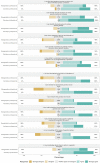Practitioners' Confidence and Desires for Education in Cardiovascular and Sudden Cardiac Death Genetics
- PMID: 35322684
- PMCID: PMC9075463
- DOI: 10.1161/JAHA.121.023763
Practitioners' Confidence and Desires for Education in Cardiovascular and Sudden Cardiac Death Genetics
Abstract
Background Educating cardiologists and health care professionals about cardiovascular genetics and genetic testing is essential to improving diagnosis and management of patients with inherited cardiomyopathies and arrhythmias and those at higher risk for sudden cardiac death. The aim of this study was to understand cardiology and electrophysiology practitioners' current practices, confidence, and knowledge surrounding genetic testing in cardiology and desired topics for an educational program. Methods and Results A one-time survey was administered through purposive email solicitation to 131 cardiology practitioners in the United States. Of these, 107 self-identified as nongenetic practitioners. Over three quarters of nongenetic practitioners reported that they refer patients to genetic providers to discuss cardiovascular genetic tests (n=82; 76.6%). More than half of nongenetic practitioners reported that they were not confident about the types of cardiovascular genetic testing available (n=60; 56%) and/or in ordering appropriate cardiovascular genetic tests (n=66; 62%). In addition, 45% (n=22) of nongenetic practitioners did not feel confident making cardiology treatment recommendations based on genetic test results. Among all providers, the most desired topics for an educational program were risk assessment (94%) and management of inherited cardiac conditions based on guidelines (91%). Conclusions This study emphasizes the importance of access to genetics services in the cardiology field and the need for addressing the identified deficit in confidence and knowledge about cardiogenetics and genetic testing among nongenetic providers. Additional research is needed, including more practitioners from underserved areas.
Keywords: cardiogenomics; cardiology; continuing medical education; genetic testing.
Figures




References
Publication types
MeSH terms
Grants and funding
LinkOut - more resources
Full Text Sources

